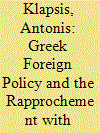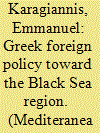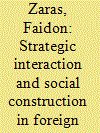| Srl | Item |
| 1 |
ID:
193153


|
|
|
|
|
| Summary/Abstract |
The year 1930 was a turning point for Greek-Turkish relations. It was the year that the two neighbouring countries set the foundations for their close diplomatic cooperation that lasted throughout the 1930s. This paper seeks to explain the reasons why Greece decided to pursue such a policy. It is argued that Athens was eager to form a pro-status quo front with Ankara in order to deter the revisionist tendencies of powers in the Balkans and the Eastern Mediterranean (namely Bulgaria and Italy). This was a strategic choice on the part of Greece which explains why it was followed by all the Greek governments (irrespectively of their ideological and/or partisan association) from 1930 until the outbreak of the Second World War.
|
|
|
|
|
|
|
|
|
|
|
|
|
|
|
|
| 2 |
ID:
125922


|
|
|
|
|
| Publication |
2013.
|
| Summary/Abstract |
Greece has enjoyed strong historical and cultural ties with countries and peoples of the Black Sea region for many centuries. During the 1990s, Greek governments largely ignored the region as they focused on the immediate Balkan neighborhood, which was in turmoil at the time. Since the early 2000s, however, Athens has developed a multidimensional policy toward the Black Sea region that deserves to be examined. This policy is based on a combination of hard and soft power resources, including economic might, military diplomacy, pipeline development, public diplomacy, multilateralism, and outreach based on political values, culture, and history. While the formation and implementation of the Greek foreign policy has remained in the hands of state officials and agencies, nonstate actors have had an important contributing role. The extent of Greek Black Sea policy's success and limitations are also discussed.
|
|
|
|
|
|
|
|
|
|
|
|
|
|
|
|
| 3 |
ID:
139375


|
|
|
|
|
| Summary/Abstract |
This essay presents the major factors that make up the framework in which Greek foreign policy operates and explores whether they have any connections to past centuries, especially to Antiquity. They include Greece’s consequential geographical location between East and West and the fact that the country has often found itself at the center of international developments and debates. It is argued that Greece’s relative weakness demands strong alliances, elicits compensatory actions, and often allows individual politicians to play an outsized role in diplomatic affairs. Finally, the salience of nationalism, the current return to a more active participation in the eastern Mediterranean, and the extraordinary resilience of the Hellenes complete an explanatory framework for Greek diplomacy with specific historic antecedents.
|
|
|
|
|
|
|
|
|
|
|
|
|
|
|
|
| 4 |
ID:
145633


|
|
|
|
|
| Summary/Abstract |
The Helsinki Strategy has provided a popular case for accounts of foreign policy change. However, certain overlooked aspects have allowed for the emergence of an empirical puzzle. The conception and adoption of the Helsinki Strategy as well as the Greek decision not to pursue a joint application to the International Court of Justice (ICJ) for the delimitation of the continental shelf in 2004 is revisited in this study. The latter decision is puzzling to the extent that Greece insisted to include a reference to the ICJ in the Helsinki Summit Conclusions as means of border dispute settlement for European Union (EU) applicants. An explanatory framework which synthesizes rational choice and constructivism and links EU level processes to domestic strategic interactions to explain policy change is constructed and applied to provide a coherent, comprehensive and theoretically valuable account of Greek foreign policy towards Turkey from 1999 to 2004.
|
|
|
|
|
|
|
|
|
|
|
|
|
|
|
|